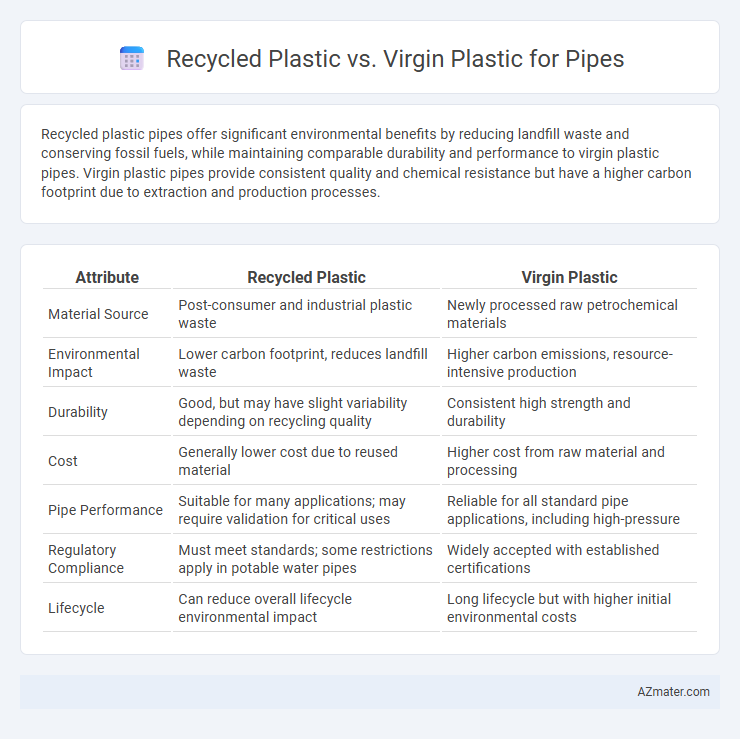Recycled plastic pipes offer significant environmental benefits by reducing landfill waste and conserving fossil fuels, while maintaining comparable durability and performance to virgin plastic pipes. Virgin plastic pipes provide consistent quality and chemical resistance but have a higher carbon footprint due to extraction and production processes.
Table of Comparison
| Attribute | Recycled Plastic | Virgin Plastic |
|---|---|---|
| Material Source | Post-consumer and industrial plastic waste | Newly processed raw petrochemical materials |
| Environmental Impact | Lower carbon footprint, reduces landfill waste | Higher carbon emissions, resource-intensive production |
| Durability | Good, but may have slight variability depending on recycling quality | Consistent high strength and durability |
| Cost | Generally lower cost due to reused material | Higher cost from raw material and processing |
| Pipe Performance | Suitable for many applications; may require validation for critical uses | Reliable for all standard pipe applications, including high-pressure |
| Regulatory Compliance | Must meet standards; some restrictions apply in potable water pipes | Widely accepted with established certifications |
| Lifecycle | Can reduce overall lifecycle environmental impact | Long lifecycle but with higher initial environmental costs |
Overview: Recycled Plastic vs Virgin Plastic Pipes
Recycled plastic pipes offer sustainable alternatives by reducing environmental impact through the reuse of plastic waste, while virgin plastic pipes provide superior strength, consistency, and durability due to their new material composition. Recycled plastic often incorporates HDPE or PP materials but may show variations in mechanical properties and chemical resistance compared to virgin polymers. Selection depends on application requirements, with recycled plastic pipes favored in non-critical infrastructure for cost-effectiveness and eco-friendliness, whereas virgin plastic pipes remain standard in high-pressure and long-term durability scenarios.
Material Composition and Sourcing
Recycled plastic pipes are primarily made from post-consumer or post-industrial plastic waste, such as polyethylene terephthalate (PET) or high-density polyethylene (HDPE), which are processed and remolded to meet industry standards. Virgin plastic pipes use newly synthesized polymers derived directly from petrochemical feedstocks, ensuring consistent molecular weight and composition for optimal mechanical performance. The sourcing of recycled plastics relies heavily on collection systems and sorting technologies, while virgin plastics depend on reliable crude oil or natural gas extraction and refining operations.
Strength and Durability Comparison
Recycled plastic pipes often exhibit slightly lower tensile strength compared to virgin plastic pipes due to potential material degradation during the recycling process. Virgin plastic pipes maintain superior durability and resistance to environmental stress cracking, ensuring longer service life in demanding applications. Advances in recycling technology have improved the mechanical properties of recycled plastics, but virgin materials generally remain the benchmark for high-strength and long-lasting pipe performance.
Environmental Impact and Sustainability
Recycled plastic pipes significantly reduce environmental impact by lowering carbon emissions and minimizing plastic waste in landfills compared to virgin plastic pipes. Using recycled materials conserves non-renewable petroleum resources and decreases energy consumption during production, enhancing overall sustainability. Life cycle assessments confirm recycled plastic pipes offer greater eco-efficiency while maintaining durability and performance standards.
Cost Analysis: Recycled vs Virgin Plastic Pipes
Recycled plastic pipes offer significant cost savings compared to virgin plastic pipes, with material expenses reduced by up to 40% due to lower raw material costs. Production of recycled pipes often consumes less energy, translating to decreased manufacturing overhead and maintenance costs. However, virgin plastic pipes may provide longer lifespan and durability, potentially lowering long-term replacement expenses despite higher initial investment.
Performance in Water and Sewage Applications
Recycled plastic pipes often exhibit comparable performance to virgin plastic in water and sewage applications, maintaining high resistance to corrosion, chemicals, and microbial growth. Virgin plastic typically offers enhanced mechanical strength and durability, ensuring longer service life under high-pressure conditions. Recent advancements in manufacturing processes have significantly improved the structural integrity and reliability of recycled plastic pipes, making them a sustainable option without compromising system efficiency.
Regulatory Standards and Certifications
Recycled plastic pipes must meet the same rigorous regulatory standards and certifications as virgin plastic pipes, including ASTM, ISO, and NSF approvals to ensure safety, durability, and environmental compliance. Regulatory bodies often require extensive testing of recycled materials for contaminants, mechanical strength, and chemical resistance to guarantee performance comparable to virgin plastics. Certification processes for recycled plastic pipes increasingly emphasize sustainable manufacturing practices without compromising pipe longevity or structural integrity.
Longevity and Maintenance Requirements
Recycled plastic pipes often exhibit comparable longevity to virgin plastic pipes when fabricated with high-quality materials and proper processing techniques, though they may show slight variability depending on resin purity and additive content. Maintenance requirements for recycled plastic pipes can be similar to those of virgin pipes, but factors such as potential microstructural inconsistencies might demand more frequent inspections to prevent early degradation. Studies indicate that advances in recycling technology and stabilization additives have significantly minimized performance gaps, making recycled plastic pipes a viable alternative for durable piping systems with optimized lifecycle maintenance.
Installation Considerations and Flexibility
Recycled plastic pipes often require careful assessment during installation due to potential variations in material density, which can affect joint compatibility and sealing performance compared to virgin plastic pipes. Virgin plastic pipes generally exhibit greater flexibility and consistent tensile strength, facilitating easier bending and fitting around obstacles without compromising structural integrity. Properly selected recycled plastic formulations can approach similar flexibility levels, but installers must account for small differences in thermal expansion and stiffness to ensure long-term reliability.
Future Trends and Innovations in Pipe Manufacturing
Future trends in pipe manufacturing emphasize the integration of recycled plastic to enhance sustainability and reduce environmental impact without compromising durability and performance. Innovations include advanced chemical recycling techniques and the development of high-performance composites that blend recycled and virgin plastics, improving mechanical properties and lifecycle efficiency. Smart manufacturing processes and digital monitoring systems are also being adopted to optimize material use and ensure quality control in pipes made from recycled plastics.

Infographic: Recycled plastic vs Virgin plastic for Pipe
 azmater.com
azmater.com